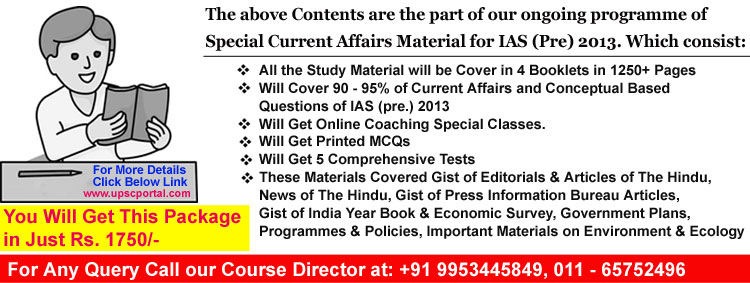NEW! The Gist (FREE) | E-BOOKS |
(IGP) Special Current Affairs Material for IAS (Pre) 2013 - PIB "Topic : Green Economy"
(IGP) Special Current Affairs Material for IAS (Pre) 2013
Chapter: Gist of Press Information Bureau Articles
Topic: Green Economy
Q. When world environment day was founded?
World Environment Day was founded by the UN in 1972 on 5 June to mark the opening of the Stockholm Conference on the Human Environment. 2012 marks the 40th anniversary of the United Nations Environment Programme and also of World Environment Day (WED), and 20 years since the first UN Conference on Sustainable Development (Earth Summit) in Brazil.
Q. What was the theme for 2012 world environment day?
The 2012 theme for World Environment Day is Green Economy. In its simplest expression, a green economy can be thought of as one which is low carbon, resource efficient and socially inclusive.
Q. What do you understand by Green Economy?
A Green Economy is one whose growth in income and employment is driven by public and private investments that reduce carbon emissions and pollution, enhance energy and resource efficiency, and prevent the loss of biodiversity and ecosystems. The Green Economy touches almost every aspect of our lives and concerns our development.
It is about sustainable energy, green jobs, low carbon economies, green policies, green buildings, agriculture, fisheries, forestry, industry, energy efficiency, sustainable tourism, sustainable transport, waste management, water efficiency and all other resource efficiency. These are all elements involved in the successful implementation of a green economy.
Q. What can be done to achieve Green Economy?
The actions which can be taken to achieve Green Economy are as under:
- Buildings: Energy audit can reduce your building’s climate footprint and lead to significant savings in energy costs.
- Fisheries: We can avoid overfishing by working to promote sustainable fishing practices. Choose sustainably harvested seafood.
- Forestry: Deforestation accounts for close to 20% of the world’s greenhouse gas emissions. Use electronic files to reduce your demand for paper products. When you support certified sustainable forest products, you support a healthy environment and sustainable livelihoods.
-
Transport: Car-pooling or taking public transport reduces environmental impacts and economic costs while strengthening community. Walking or riding a bike for short trips is good for your health - and the environment’s, too! When you choose alternative transportation methods, you support a Green Economy in the transport sector.
-
Water: Taking small steps towards wise water use can help conserve this precious resource. Turn off the tap when you’re not using it, wait until you have a full load to run your washing machine, limit shower time, and don’t water your lawn right after a rain. Resource efficiency is key to a Green Economy and water is one of our most important resources.
-
Agriculture: It’s time to support sustainable agriculture to ensure our ability to feed everyone. Grow your own vegetables, and shop at local farmers’ markets. When you buy local, organic, and sustainable food products, you send a message to producers that you support a Green Economy for agriculture.
-
Energy: You can support the development of clean, renewable energy by choosing businesses and products that invest in them - or by investing in them yourself. While we work towards a transition to renewable energy, consider ways to improve your personal energy efficiency. Turn off lights and unplug appliances when you are not using them.
-
Waste: Recycling appropriate materials and composting food waste reduces the demand on our natural resources. In this significant year for the environment and sustainable development, the world leaders will once again meet at the United Nations Conference on Sustainable Development twenty years after the historic Earth.

